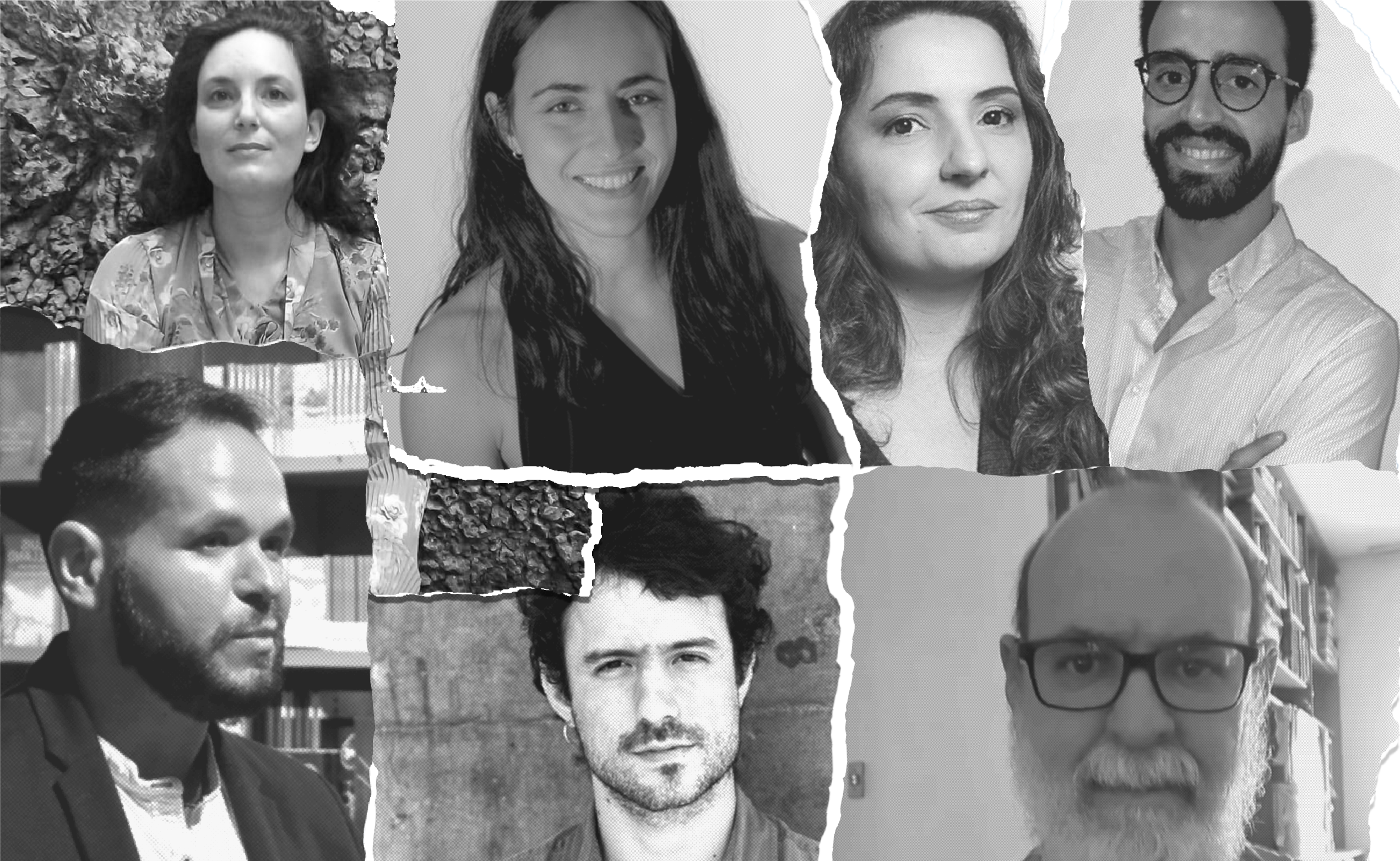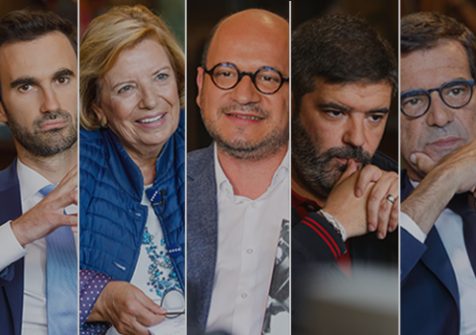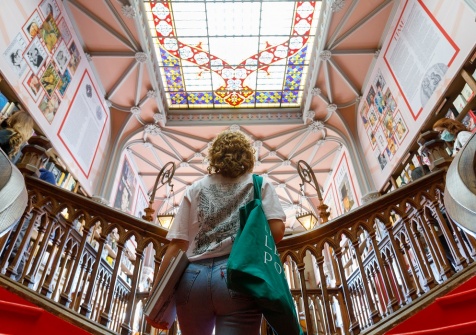Blog
24 of September of 2021
When the dream is to write: what changes after winning a literary award?

Exactly a year ago, on World Dream Day, the winners of the literary competition “Quarantine Short Stories” were announced. To mark the date, we talked with Cláudia Barbieri, Cláudia Fernandes, Frederico Klumb, Helena Correia, Hugo Araújo, Márcio Cruzeiro and Mathieu Fleury, to understand what has changed in the last year.
In 2020, during the first confinement resulting from the COVID-19 pandemic, Livraria Lello promoted liberation through writing, with a short story competition, aimed at new talents. The six best short stories received a monetary prize of one thousand euros each and were published in the work The Quarentine Tales, edited by Livraria Lello.
Winning a literary competition like this can be a dream come true, or the beginning of a bigger dream. A year (and some quarantines) later, some of the “Quarantine Short Stories” winners have undergone major changes in their lives, others not at all. Everyone continues to write.
After a period of great uncertainty in the Brazilian education system, Cláudia Barbieri (Rio de Janeiro, Brazil) returned to teaching at the Universidade Federal Rural do Rio de Janeiro (UFRRJ), and with an increased workload. The author of As Netas de Bernarda Alba continues to write short stories and chronicles, always with historical research as her main theme. Later this year, she will publish her first book, the result of research on the city of Lisbon in the work of Eça de Queirós.
Music student Helena Correia (Lisbon, Portugal) was forced to interrupt her course in England due to the pandemic and returned to her family's home. In a year she described as “complicated”, the writing functioned as a “therapy”, which helped the co-author of O Duel to “lighten the burden” of a life put on hold.
“It's great to have an echo of the meeting of our ideas with each other” Mathieu Fleury
Márcio Cruzeiro (Goiânia, Brazil), considers that winning a literary competition “was transforming from the point of view of visibility and also of incentive for creation”. However, he left one of the two jobs he had and now has more time to read and write. He is finishing a book of short stories, which he intends to publish in 2022 and already has a project for a novel, to start then and publish between the end of 2022 and the beginning of 2023. The author of 2 Billions writes to “give visibility to the invisible”, “the victims of the bitterness created by an egocentric society: the homeless, the marginal, victims of prejudice”.
Hugo Araújo (Viana do Castelo, Portugal) finished his internship as a psychologist, joined the Ordem dos Psicólogos Portugueses, and is currently working at the Family Assistance Office of Viana do Castelo. The author of Brief Account of the Madness of Menino Jesus continues to write short stories and participate in competitions. He takes advantage of them “to experiment, in freedom, without pressure on consistency or quality”.
Nurse Mathieu Fleury (Lisbon, Portugal) still divides his time between writing, illustration and the hospital. Winning a literary award brought him “anxiety to continue writing, with the added responsibility” of his work having already been recognized. However, he began writing a novel, which was halfway through, to make way for another project: a storybook. It is “a set of stories, with different characters, all around the same self-service laundry”, said the author of A Balada do Mamífero.
Nowadays, for Frederico Klumb (Rio de Janeiro, Brazil), writing, whether for his master's thesis or poems and short stories, is the main activity. Last year, the author of Os Gatos signed a contract with a publisher for the publication of his first book of short stories. The work, which he began preparing three years ago, will be published at the end of the first half of 2022. Participation in the contest “Tales from Quarantine” was “important in the process of creating this book, as it served as a test for some writing solutions ”.
Lastly, Cláudia Fernandes (Lisbon, Portugal), who, together with Helena Correia, wrote O Duelo, continues to be a yoga instructor and dedicates herself professionally to writing, like Cláudia Andrade. This week she published her third book: A Little Gray and Glory. Also in 2021, she received a literary grant from the Directorate-General for Books, Archives and Libraries (DGLab), for literary production in the context of the pandemic.
In 2020, during the first confinement resulting from the COVID-19 pandemic, Livraria Lello promoted liberation through writing, with a short story competition, aimed at new talents. The six best short stories received a monetary prize of one thousand euros each and were published in the work The Quarentine Tales, edited by Livraria Lello.
Winning a literary competition like this can be a dream come true, or the beginning of a bigger dream. A year (and some quarantines) later, some of the “Quarantine Short Stories” winners have undergone major changes in their lives, others not at all. Everyone continues to write.
After a period of great uncertainty in the Brazilian education system, Cláudia Barbieri (Rio de Janeiro, Brazil) returned to teaching at the Universidade Federal Rural do Rio de Janeiro (UFRRJ), and with an increased workload. The author of As Netas de Bernarda Alba continues to write short stories and chronicles, always with historical research as her main theme. Later this year, she will publish her first book, the result of research on the city of Lisbon in the work of Eça de Queirós.
Music student Helena Correia (Lisbon, Portugal) was forced to interrupt her course in England due to the pandemic and returned to her family's home. In a year she described as “complicated”, the writing functioned as a “therapy”, which helped the co-author of O Duel to “lighten the burden” of a life put on hold.
“It's great to have an echo of the meeting of our ideas with each other” Mathieu Fleury
Márcio Cruzeiro (Goiânia, Brazil), considers that winning a literary competition “was transforming from the point of view of visibility and also of incentive for creation”. However, he left one of the two jobs he had and now has more time to read and write. He is finishing a book of short stories, which he intends to publish in 2022 and already has a project for a novel, to start then and publish between the end of 2022 and the beginning of 2023. The author of 2 Billions writes to “give visibility to the invisible”, “the victims of the bitterness created by an egocentric society: the homeless, the marginal, victims of prejudice”.
Hugo Araújo (Viana do Castelo, Portugal) finished his internship as a psychologist, joined the Ordem dos Psicólogos Portugueses, and is currently working at the Family Assistance Office of Viana do Castelo. The author of Brief Account of the Madness of Menino Jesus continues to write short stories and participate in competitions. He takes advantage of them “to experiment, in freedom, without pressure on consistency or quality”.
Nurse Mathieu Fleury (Lisbon, Portugal) still divides his time between writing, illustration and the hospital. Winning a literary award brought him “anxiety to continue writing, with the added responsibility” of his work having already been recognized. However, he began writing a novel, which was halfway through, to make way for another project: a storybook. It is “a set of stories, with different characters, all around the same self-service laundry”, said the author of A Balada do Mamífero.
Nowadays, for Frederico Klumb (Rio de Janeiro, Brazil), writing, whether for his master's thesis or poems and short stories, is the main activity. Last year, the author of Os Gatos signed a contract with a publisher for the publication of his first book of short stories. The work, which he began preparing three years ago, will be published at the end of the first half of 2022. Participation in the contest “Tales from Quarantine” was “important in the process of creating this book, as it served as a test for some writing solutions ”.
Lastly, Cláudia Fernandes (Lisbon, Portugal), who, together with Helena Correia, wrote O Duelo, continues to be a yoga instructor and dedicates herself professionally to writing, like Cláudia Andrade. This week she published her third book: A Little Gray and Glory. Also in 2021, she received a literary grant from the Directorate-General for Books, Archives and Libraries (DGLab), for literary production in the context of the pandemic.



 (1).png)